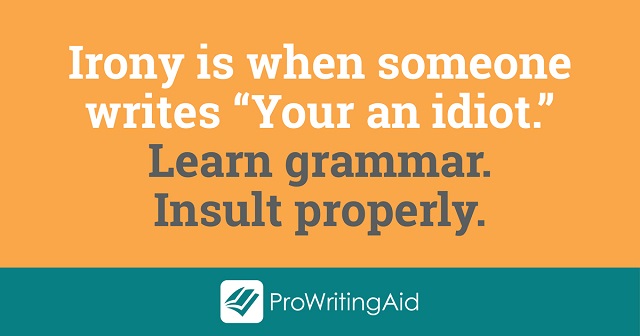
What is irony? People float the phrase "how ironic" in casual conversation without a true understanding of what irony really is. Let’s give a face to irony with examples from Shakespeare, the King of Irony.
Definition of Irony
Irony is a literary device used to depict a character’s words or situation that is intentionally different in meaning from the literal one.
Let’s say your main character is invited to a party she knows will be rife with alcohol and drugs, which she abhors. Because she craves to be accepted by the popular kids at the party, she responds, "Sure, I’ll go. This will be fun." The reader knows your character means the exact opposite, that in reality, she will be miserable. The wording is positive, but the literal meaning is negative.

Types of Irony
There are three types of irony you can use in your stories.
1. Verbal Irony
The above example illustrates verbal irony. A character says something that means something different from what they appear to be saying. When you say, "Lovely day we’re having" during a hurricane, that’s verbal irony. And a bit of sarcasm rolled in for good measure.
2. Situational Irony
Your reader expects something to happen, but what actually happens is quite different. For example, say a family plans an elaborate surprise party for their mother’s 50th birthday. But they get the date wrong, and they find out she’s only 48. Mom is not surprised, nor is she very pleased.
3. Dramatic Irony
Your readers are more aware of what is happening in your story than your characters are. The epitome of dramatic irony is the audience screaming at a horror movie’s main character to not go into the house because they know the killer is hiding there. And yet, movie after movie, those silly people keep opening the door and going inside.
Examples of Irony
Let’s look at a few of Shakespeare’s plays for excellent examples of irony. (Spoiler alert: key plot points for each play are revealed below!)
Julius Caesar
In Julius Caesar, Shakespeare uses irony to create Mark Antony's cutting funeral oration: "Yet Brutus says he was ambitious; and Brutus is an honorable man." The repeated assertion of Brutus' honesty against a backdrop of half-truths serves to undermine Brutus' word in the minds of the assembled friends, Romans and countrymen.
Romeo and Juliet
This Shakespeare play is full of irony. One example of verbal irony is when Juliet tells her mother, "I will not marry yet; and, when I do, I swear it shall be Romeo, whom you know I hate, rather than Paris." But readers know that Juliet is planning to marry Romeo that very night. She’s throwing shade at her mom.
The play itself is a form of situational irony. You think it’s a love story, but it’s actually a tragedy. The two lovers end up dead in the end—certainly not a typical love story.
Finally, when Romeo finds Juliet in a drugged sleep, he’s certain she’s dead. So what does he do? He kills himself. Later, when Juliet wakes up, she finds her lover dead. So what does she do? She commits suicide. It’s ironic that people think of Romeo and Juliet as a romance when it’s so obviously a tragedy.
Othello
In this Shakespeare play, Othello believes that Desdemona has cheated on him, thanks to Iago who lies to Othello about her supposed infidelity. Readers and audience members know that Desdemona has been true to Othello, a perfect example of dramatic irony.
Macbeth
Another great play full of irony, Macbeth plans to murder Duncan, all the while pretending loyalty to him. Duncan has no clear notion of Macbeth’s plans, but the audience knows what Macbeth is planning. Shakespeare makes the audience want to warn Duncan of what they know, a great example of dramatic irony.
Macbeth kills Duncan to gain the throne and its power, but he soon realizes he must keep murdering others to maintain his power. In the end, the people despise Macbeth and he despises them.
Hamlet
One of the more famous Shakespeare quotes, Hamlet’s first words in the play are, "A little more than kin, and less than kind." He is referring to his uncle, who is now his stepfather. So he’s suddenly a little more than kin because he is related two ways, but he’s less than kind because he is the one who killed Hamlet’s father. Irony at its best.

How to Use Irony in Your Next Manuscript
Irony ratchets up the tension. When your readers know the truth, yet the main character is oblivious, you enhance the suspension and dread.
It could be used to increase the romantic tension when there’s a fundamental misunderstanding between the two love interests that keeps them apart. Say your male protagonist meets an attractive travel agent in a restaurant to plan a weekend getaway so he can propose to the female lead. But your female protagonist sees him with this other woman and thinks he’s cheating. Your readers know the truth, but you have the couple split up because of an honest misunderstanding.
You can use irony to set up a comedic situation or to create empathy between your characters. It can be an ironic situation when one character believes her long-dead husband is speaking to her from beyond the grave. But your readers know it’s really the postman leaving little notes in her mailbox.
Or use irony to make a final statement about your story’s theme. Consider how the climax in Star Wars is Darth Vader saying, "Luke, I am your father." Oh, the irony.
Finally, create your plot twists and surprises around irony. Anytime you can turn your story’s plot on its head around an ironic situation, you’ll grab readers’ attention. When you compel your readers to scream, "Don’t go in that room," you know you’ve got them exactly where you want them.

